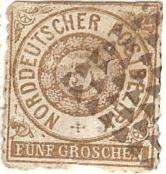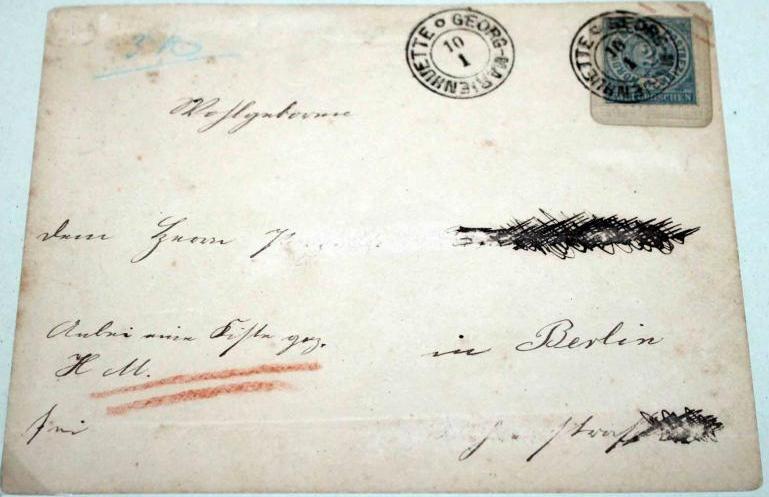 |
|||||
|
|||||
| Preview of Stamps Catalogue: VOLUME 1 |
 |
|||||
|
|||||
| Preview of Stamps Catalogue: VOLUME 1 |
Return To Catalogue - Other German States - Germany
Note: on my website many of the
pictures can not be seen! They are of course present in the catalogue;
contact me if you want to purchase it.
Currency: North: 30 Groschen = 1
Thaler
South: 60 Kreuzer = 1 Gulden
The North German Confederation (Norddeutscher Postbezirk) included the following postal services: Saxony, Mecklenburg Schwerin, Mecklenburg Strelitz, Oldenburg, Brunswick, Prussia, and the cities Hamburg, Lubeck and Bremen. It used its own stamps from 1868 until 1872, when they were replaced by the stamps of the German Empire.
1/4 Groschen violet 1/3 Groschen green 1/2 Groschen orange 1 Groschen red 2 Groschen blue 5 Groschen brown
Value of the stamps |
|||
vc = very common c = common * = not so common ** = uncommon |
*** = very uncommon R = rare RR = very rare RRR = extremely rare |
||
| Value | Unused | Used | Remarks |
Rouletted |
|||
| 1/4 g | ** | * | |
| 1/3 g | *** | * | |
| 1/2 g | *** | c | |
| 1 g | *** | vc | |
| 2 g | *** | c | |
| 5 g | R | * | |
| Perforated 13 1/2 x 14 1/4 | |||
| 1/4 g | *** | *** | |
| 1/3 g | * | c | |
| 1/2 g | c | c | |
| 1 g | c | vc | |
| 2 g | * | c | |
| 5 g | * | * | |
Typical cancels:

Two-ring cancel or 'Zweikreis Ortsstempel'; reduced size

One-ring cancel or 'Einkreis Ortsstempel'

Box cancel or 'Kastenstempel'; I've also seen it with sharp
corners (truely rectangular shape)


(Horse shoe cancel or 'Hufeisen Stempel')

A forgery of the 5 g value with the lettering different. The
cancel consists of a square(?) of small triangles. Since I don't
think this cancel was ever used, this is probably a forgery to
deceive stamp collectors.
10 Groschen grey 30 Groschen blue Obliteration: by signature
Value of the stamps |
|||
vc = very common c = common * = not so common ** = uncommon |
*** = very uncommon R = rare RR = very rare RRR = extremely rare |
||
| Value | Unused | Used | Remarks |
| 10 g | RRR | *** | |
| 30 g | R | *** | |
1 Kreuzer green 2 Kreuzer orange 3 Kreuzer red 7 Kreuzer blue 18 Kreuzer brown
Value of the stamps |
|||
vc = very common c = common * = not so common ** = uncommon |
*** = very uncommon R = rare RR = very rare RRR = extremely rare |
||
| Value | Unused | Used | Remarks |
Rouletted |
|||
| 1 k | *** | *** | |
| 2 k | *** | *** | |
| 3 k | R | * | |
| 7 k | RR | ** | |
| 18 k | *** | *** | |
| Perforated 13 1/2 x 14 1/4 | |||
| 1 k | ** | * | |
| 2 k | *** | R | |
| 3 k | c | c | |
| 7 k | * | * | |
| 18 k | RR | RRR | |

Similar designs were issued for Wurttemberg
I've seen a 18 k perforated stamp with forged postmark 'WORMS 6/6' in a single circle.
Forged 18 k stamps, examples:

('FACSIMILE' below the '18', reduced sizes)
My 1988 Michel Deutschland-Spezial Katalog says that some forgeries made by the stamp forger Foure exist of the 1 and 2 gr stamps. They are printed in much brighter colors.
(1/2 Sch.) brown
Value of the stamps |
|||
vc = very common c = common * = not so common ** = uncommon |
*** = very uncommon R = rare RR = very rare RRR = extremely rare |
||
| Value | Unused | Used | Remarks |
| 1/2 s | *** | *** | rouletted |
| 1/2 s | * | * | perforated 13 1/2 x 14 1/4 |
1/4 g black 1/3 g black 1/2 g black 1 g black 2 g black
These stamps are perforated 14 1/4 x 14. They have a brown underprint.
Value of the stamps |
|||
vc = very common c = common * = not so common ** = uncommon |
*** = very uncommon R = rare RR = very rare RRR = extremely rare |
||
| Value | Unused | Used | Remarks |
| 1/4 g | *** | *** | |
| 1/3 g | ** | ** | |
| 1/2 g | * | * | |
| 1 g | c | c | |
| 2 g | * | * | |
1 k black 2 k black 3 k black 7 k black
These stamps are perforated 14 1/4 x 14.
Value of the stamps |
|||
vc = very common c = common * = not so common ** = uncommon |
*** = very uncommon R = rare RR = very rare RRR = extremely rare |
||
| Value | Unused | Used | Remarks |
| 1 k | *** | RR | |
| 2 k | *** | RRR | |
| 3 k | *** | *** | |
| 7 k | *** | R | |
Forged cancels exist (since the unused stamps are much cheaper), example of a forged cancel:
According to the Vierteljahrs-Nachträge zum permanenten Handbuch der Postfreimarkenkunde und dem Permanent-Sammelwerk in losen Blättern von Hugo Krötzsch (1896), page 4 (http://www.archive.org), the stamps of the North German Federation are also interesting, since many of the old German States cancels were still in use. Some of these old German States cancels were even used in the German Empire. According to this book, most of the old German States used cancels in which the day and month are placed below each other, while the cancelling devices specially developed for the North German Ferderation have the day and month placed side by side.

1/2 Groschen blue 1 1/4 Groschen blue 2 1/2 Groschen blue 4 Groschen blue 5 Groschen blue 8 Groschen blue 10 Groschen blue 30 Groschen blue
For the specialist: The stamps are perforated 13 1/2 x 14 1/2 and have no watermark. There exists a misprint of the 10 gr with inverted value. Typical cancels: penstrokes in black and red, both on the same stamp. Similar telegraph stamps exist for the German Empire: inscription "TELEGRAPHIE DES DEUTSCHEN REICHES".

1 1/4 g with different lettering and printed perforation, most
likely a cut from a catalogue?

The text runs through the envelope (reduced size)
1/3 Groschen green 1 Groschen red (overprinted Post-Couvert) 1 Kreuzer green 3 Kreuzer red (overprinted Post-Couvert)

Envelope of Prussia, with 1 g stamp and overprint
The stamps 1 Groschen, 2 Groschen and 3 Kreuzer were used to cover the various envelopes of the individual states who joined the confederation. They have overprint: NORDDEUTSCHER POSTBEZIRK in very small letters, and they are very rare. They exist for Brunswick, Oldenburg, Prussia, Mecklenburg-Strelitz and Saxony.
An example of a cut from an envelope of Prussia, where the stamp has been removed by a stamp collector:

The stamp forger Foure made forgeries of these envelopes:

A Foure forgery, with forged "DAHLHAUSEN" cancel. This
cancel was bought by Fournier from a old-metal dealer (source
P.Ohrt, Handbuch der Neudrucke, page 598).

Another Foure forged envelope, now with a "GEORG-MARIENHUTTE
10 1" cancel.

The following values exist: 1 g, 1 1/2 g, 3 g, 4 1/2 g, 6 g, 7 1/2 g, 9 g, 12 g, 15 g, 22 1/2 g, 30 g, 45 g, 60 g, 90 g, 150 g and 300 g. All these stamps have the colour lilac (with brown value inscription), they are perforated (the above specimen has the perforations cut off). Similar stamps were issued for the German Empire, but then with inscription "DEUTSCHER WECHSELSTEMPEL".